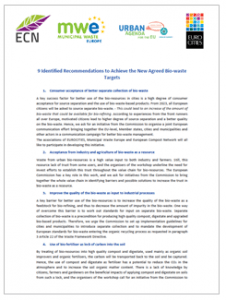On the 28 May, the organisations of EUROCITIES, Municipal Waste Europe, European Compost Network, City of Oslo and the Urban Agenda Partnership on Circular Economy organised the workshop “The road to an urban bioeconomy: Barriers and solutions to closing the loop of bio-resources” in Brussels with more than 70 participants. The participants identified and discussed different barriers and possible solutions to help cities to a better management of bio-resources.
Europe has taken an important first step in its ambition to achieve a circular bioeconomy by agreeing new rules for separate bio-waste collection and recycling. This is a significant milestone for the composting, anaerobic digestion sectors and bio-refineries, which are now poised to play a pivotal role in transforming bio-wastes into valuable products such as compost, renewable energy and bio-based products such as chemicals and plastics. As only about one-third of Europe’s bio-waste is currently recycled, this presents a momentous opportunity for the sector to invest in new infrastructure, manufacture sustainable products and create an additional 50 000 jobs within a European circular bioeconomy.
As an outcome of the roundtable discussion at the workshop 9 recommendations were identified to achieve the new agreed bio-waste targets.
1.  Consumer acceptance of better separate collection of bio-waste
Consumer acceptance of better separate collection of bio-waste
2. Acceptance from industry and agriculture of bio-waste as a resource
3. Improvement in the quality of bio-waste input to industrial processes
4. Use of bio-fertiliser as lock of carbon into the soil
5. Regulatory barriers for better use of bio-resources
6.The need for research and support of new technologies
7. Understanding the value of urban bio-waste and its valorisation and recovery through the production of high-value bio-based products – economic, social and sustainability aspects
8. Developing a European bioeconomy
9. Local governance for better bio-resource management
Based on these recommendations the organisers of the workshop will follow-up the discussion with the European Commission.
The joint recommendations can be downloaded here.
